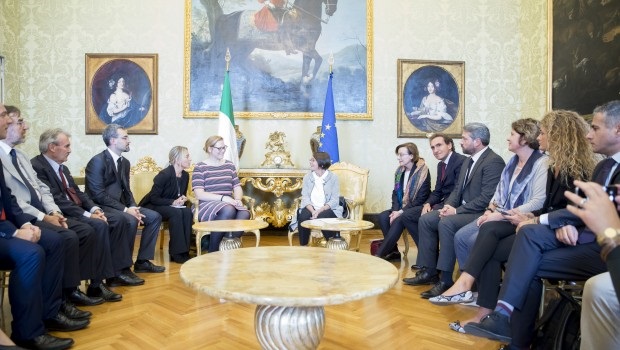More than 200 Members of Parliament from most Italian parties have signed the ICAN parliamentary pledge and thereby committed themselves “to work for the signature and ratification” of the nuclear ban by the Italian Government. Italy is now well-positioned to advance the conversation on the Treaty on the Prohibition of Nuclear Weapons within the NATO alliance.
The largest group of signatories comes from the main governing party, the Democratic Party affiliated with the Socialists & Democrats at a European level). Stella Bianchi spearheaded this effort, and actively invited parliamentarians from all parties to join the ICAN pledge. In doing so, she noted that the “inhumane nature of nuclear weapons and their devastating impact has for decades been testified by the Hibakusha, the survivors of Hiroshima and Nagasaki. Recent, terrible menaces evoking the recourse to nuclear arsenals have convinced us of the absolute necessity to work for the abolition of all nuclear arms, including via the full implementation of the non-proliferation treaty (NPT) and working towards a signature, also by our country, of the treaty prohibiting nuclear weapons.”
“We welcome the strong support ICAN received from across the political spectrum. It’s particularly encouraging to see so many supporters from the government: We count on them to push Italian ratification of the ban treaty, building on the resolution adopted on 19 September,” saud Leo Hoffmann-Axthelm, ICAN’s Brussels representative.
The resolution adopted last month instructed the Italian Government to “explore” possibilities to ratify the ban treaty in line with alliance commitments. “This shows that Italy is willing to play a leading role within NATO in driving the conversation forward, and clarifying that there is no inherent contradiction between the North Atlantic Treaty and the prohibition of nuclear weapons,” continued Hoffmann-Axthelm.
In spite of NATO’s recent positioning, the alliance has traditionally been flexible towards the wishes of its members, and open to opt-outs from specific policy areas, such as nuclear planning. Similar processes unfolded when parts of the alliance joined the bans on cluster munitions in 2008 and landmines in 1997.
“The broad support for ICAN’s pledge reflects Italian public opinion, which has long favoured the prohibition of these weapons. The ban treaty can be an occasion to finally make progress for nuclear disarmament,” concluded Francesco Vignarca, coordinator of ICAN-partner Rete Italiana per il Disarmo.
Donatella Duranti and Michele Piras, for the Democratic and Progressive Movement said, “Stopping the nuclear threat and war is an act of love towards the whole of humanity. The mother of all causes that it is worth pursuing. It is for these reasons that we support the call of ICAN.”
Tatiana Basilio of the Five Star Movement said, “Our group at the Chamber of Deputies has long supported nuclear disarmament, with concrete and real undertakings, represented also in parliamentary motions. Our hope is that all of these voices will be heard by the highest levels of the political world.”
Giuseppe Civati, of Possibile, “Thanks to ICAN’s efforts, the United Nations in July adopted the Treaty on the Prohibition of Nuclear Weapons, open for signatures since 20 September. (…) Italy is not yet among the signatories, and has not at all distinguished itself in the process leading towards its adoption. This year’s Nobel Prize must lead to a renewed call for Italy to speedily ratify this treaty.”










